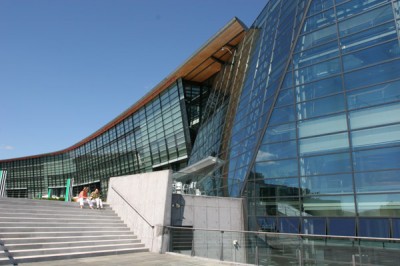UPDATED: Beleaguered staff at Telenor’s headquarters were left having to apologize for new, separate errors that affected customers across the country before and during the weekend. By Tuesday the latest crash of mobile servers remained a mystery.

The new problems began on Friday just a week after up to 3 million mobile telephone customers were unable to use Telenor services for as long as 18 hours during the Pentecost holiday weekend. Telenor had already delivered a report on those problems and promised compensation – and now faces further investigations and embarrassment.
More mobile chaos
Friday’s latest problems in the mobile network began after a breach in a connection between Bodø and Trondheim in north Norway. According to Telenor, this led to 15 seconds of “instability,” after which affected telephones needed to be updated. This updating process caused signal problems that central exchanges could not handle, leaving some clients in northern regions without telephone services between 14.30 and 17.30. The problems mostly involved the 2G network (also known as the GSM network), meaning considerably fewer customers were affected than the week before, when as many as 3 million people experienced problems.
A director of Telenor Norway, Bjørn Amundsen, told news agency NTB that the company “understands that customers are frustrated,” adding that “if it is any consolation, we are frustrated as well.”
By Tuesday, Telenor still couldn’t say what set off Friday’s burst of signals that were sent out to connect telephones to Telenor’s network and servers, and which in turn led to a capacity overload. Amundsen told newspaper Aftenposten that Telenor at the time wasn’t anywhere near its capacity limits before the signal burst, and “we received no warning” that any sudden large strain on the system was on the way.
Hospital data systems failed
Just a day later, Akershus University Hospital in Oslo was also left without telephones or data systems for 14 hours, from Saturday to Sunday, during which new patients could not be admitted and 13 had to be turned away. Chief county medical officer Petter Schou told newspaper Aftenposten that had the events lasted longer, a serious crisis would have affected the entire region of Oslo and surrounding counties. Although Telenor provides network services to the hospital, the problems were not connected to any other the issues Telenor has been having recently, and the reason for the problems is as yet unknown.
Health minister Anne-Grete Strøm-Erichsen told NTB that she will now have a full investigation into the matter. Two such investigations have already been launched by both the health authority and the hospital itself. “It is obviously very serious when the data system prevents the admittance of new patients,” Strøm-Erichsen said, although the minister was relieved that crisis management systems, including a new digital emergency network, worked and it “does not look like it has harmed patient safety.” Hospital staff also used private telephones and other means to communicate between departments.
No phones ‘for six days’
In yet another separate incident, landline connections to the local municipality operations in Åfjord, north Norway, were down for nearly seven days after recent storms battered the area. The region had been hit by a record number of lightening strikes that originally caused the problem, which was first reported on Sunday 12 June. According to Kent Hallbäck, the head of health and welfare at the local municipality who spoke to Norwegian Broadcasting (NRK), he heard “nothing” back from Telenor between when the problem was reported and when the landlines returned to operation. He confirmed that the “town hall, doctor’s service, home nursing service, hospital and biggest school” in the region of 3,220 people “had all lost connections.” Telenor were able to, as a temporary measure, put in place a call transfer service from the doctors’ office’s number to a mobile phone that could be used by the practice.
Telenor themselves have claimed to NRK that the first time they registered any problem was on Wednesday June 15, and that the issue only affected the municipality’s phones. A regional spokesperson described the problems to NRK as a “double error” that required work right up until midday on Friday June 17. The spokesperson did not blame the municipality for the fact that the complaint was not registered by the company until Wednesday, instead blaming “weaknesses in routines” at Telenor, for which he apologized “in the strongest terms.”
The Conservative Party has added to calls for a full investigation, with one of their parliamentarians, Linda Hofstad Helleland, suggesting that Telenor has reacted slower to problems in Norway’s districts than it has to central areas. “It seems like they move heaven and earth when the network is down in Østlandet [the core populous region of Norway] but when landlines in a district go down, no-one takes a hold of it,” Hofstad Helleland commented to NRK.

Further investigations on the way
Telenor has managed to escape a fine thus far from the state post and telecommunications authority for its recent troubles. The authority had delivered a critical report of Telenor’s recent problems to the transport and communications department on Friday – the same day that the latest troubles flared up. The authority’s director, Willy Jensen, said he found Telenor’s own explanations of the signalling problems to be “strange” and “surprising.” He nonetheless told NTB that a fine had only been dismissed in the “first round” of evaluations and that it “will be continually considered.” Jensen was pleased to see that Telenor’s own investigation had come to similar conclusions as his about the source of the problems and the measures that needed to be taken, even if he was not aware of any other telecommunications company in Europe that had experienced such issues. He added that the company had been penalized enough and that “a fine of one million or five doesn’t mean anything.”
The two incidents in the last week that Telenor has experienced with its mobile network involve problems with signfal traffic, which relates to use of smartphones to check email, the connection of conservations and geographic placement. Smart phone use in general has been blamed as one of the central sources of the problems, as many smartphone applications take up signal capacity through use of the global position system (GPS). Telenor spent the weekend putting in place more central servers to deal with traffic, a process which the company says usually takes several months. Over a hundred employees were engaged in such activities, and the firm has at the same time changed its processes so that mobile phones will not update as regularly in order to avoid further capacity issues.
Transport and communications minister Magnhild Meltveit Kleppa, a representative of the Center Party, has also formed a committee to examine and address the weaknesses in the Norwegian telecommunications network, telling NRK that the committee will report back “by November 1.”
‘Economists are in charge’
Meanwhile, some employee representatives at Telenor have expressed concerns that management has become top-heavy with finance professionals and lacks technical expertise. They also claim Telenor is not doing enough research anymore and sold off divisions responsible for operations and maintenance of the telecommunications network in 2006. Such services are leased back to the company but are no longer part of the “Telenor family.”
Jan Riddervold, who represents civil engineers at Telenor, told Aftenposten, “we used to be a knowledge-based company, but have shut down our research activities and sold off much of our technical competence.” According to Riddervold, “now it’s economists who are in charge, and they lack certain competence.”
Worryingly, the CEO of Telenor Norway, Ragnar Kårhus, could not rule out further problems. “I cannot stand here and say that this won’t happen again,” he told a press conference reported by NRK, but stressed that “we now have routines in place that can handle issues quickly.” Telenor’s global CEO, Jon Fredrik Baksaas, participated in the press conference via telephone from St. Petersburg, where he had been attending meetings, and described the recent situation as “very regrettable” and “painful” for the company. Baksaas had been criticized for not taking a strong enough public stand over the issue last week.
Views and News from Norway/Aled-Dilwyn Fisher
Join our Readers’ Forum or comment below.
To support our news service, please click the “Donate” button now.

